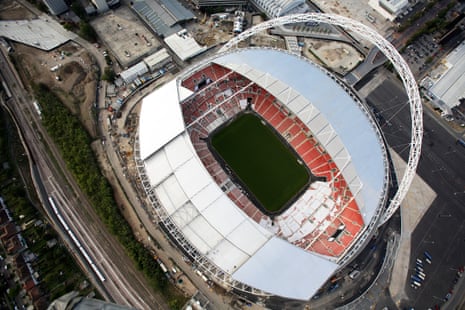Football’s coming home. Sort of. After Wembley was named by Uefa as the host for the semi-finals and final of its ambitious pan-continental Euro 2020 finals, Roy Hodgson predicted the decision will provide a big incentive for the younger players in his England squad to win it.
Uefa’s president, Michel Platini, confirmed that Wembley had been unanimously awarded the so-called “finals package” after the German Football Association, the only rival bid, said it was more interested in hosting Euro 2024 in its entirety and in effect withdrew.
The FA’s chairman, Greg Dyke, said there was no binding deal with the Germans, who will host a quarter-final and three group stage matches instead in Munich’s Allianz Arena, but confirmed it would likely back them for Euro 2024.
Glasgow’s Hampden Park and Dublin’s Aviva Stadium will also host three group stage games and one last-16 match each, but Cardiff’s Millennium Stadium narrowly missed out to the disappointment of the Welsh FA.
“Wembley is a great stadium. It’s been completely rebuilt since 1996 and is now a beautiful stadium,” said Dyke, recalling the last time that England hosted a major football tournament at Euro 96. “Some of the current players will still be around in 2020 and this will be a great ambition for them to take us to Wembley. It is an incentive.”
Hodgson said that while he was focused on qualifying for Euro 2016 in France, the FA’s success in securing the semi-finals and final was a “major honour and a great boost” for English football.
“For the young team that is emerging, many of those players will be at their best football years in 2020,” the 67-year-old England manager said. “If the young players of today don’t use this to spur them on then they are making a mistake. By 2020 some of them will be playing their fifth tournament and that is the type of experience you can’t buy.”
Platini’s scheme to stage the European Championship across 13 countries, conceived after Turkey pulled out of the running to host the tournament and billed as a one-off celebration of the event’s 60th anniversary, has divided opinion.
London will host a “week of football” at the climax of a tournament that will be played across 13 countries from the Republic of Ireland in the west to Azerbaijan in the east. The latter’s capital, Baku, will host a quarter-final and three group stage matches, along with Munich, Rome and St Petersburg.
Copenhagen, Bucharest, Amsterdam, Bilbao, Budapest and Brussels will all, like Dublin and Glasgow, host one last-16 game and three group stage matches.
The cities will be grouped in geographical clusters. Uefa’s general secretary, Gianni Infantino, confirmed that while no teams would qualify as of right, those that did would be guaranteed at least two matches in their home country. The exception is England, who will have to reach the semi-finals in order to play in front of their own fans.
The victory for the FA represents a gentle reintroduction to the bruising world of bidding for international tournaments after the humiliation and controversy of its £21m 2018 World Cup bid, which received just two votes.
As with many of Platini’s grandiose schemes, the pan-continental vision for 2020 has split opinion. Some believe it will provide a refreshing change, with the use of existing stadiums avoiding the usual immense outlay and fans in countries that would not be able to host the tournament alone being involved. But others believe it will be a logistical nightmare, with fans forced to criss-cross the continent to follow their teams in a tournament that will lack the cohesion and energy that a single host provides.
Platini described the idea as a “great adventure”, arguing that there are low-cost flights across the continent and that all of the chosen cities have major international airports.
“We haven’t only voted on their national stadium and the beauty of their country, we’ve also voted on accommodation and so forth.”
The Welsh bid lost out by just a single point to Scotland in the final phase of voting by the executive committee under the complex ranking system devised by Uefa. The Scottish FA’s chief executive, Stewart Regan, said the success of the Commonwealth Games and a passionate video address by Sir Alex Ferguson had helped sway the decision. “Everyone saw what Glasgow was capable of with the Commonwealth Games and that really put Glasgow on the map, it was a huge factor and we used that in our film,” he said. “Sir Alex Ferguson came in last week with a video in support of our bid and spoke passionately about it and I am sure that must have helped.”
Jonathan Ford, the Football Association of Wales chief executive, said he was “bitterly disappointed” that the Millennium Stadium was not chosen. “We will be dignified in defeat but we will move onwards and upwards. We had a very strong bid but at the end of the day it’s down to the politics and down to a vote.”
Euro 2020 venues
Final and semi-finals Wembley Stadium, England
Three group games and one quarter-final Baku, Azerbaijan; Munich, Germany; Rome, Italy; St Petersburg, Russia
Three group games and one last-16 match Dublin, Republic of Ireland; Glasgow, Scotland; Copenhagen, Denmark; Bucharest, Romania; Amsterdam, the Netherlands; Bilbao, Spain; Budapest, Hungary; Brussels, Belgium

Comments (…)
Sign in or create your Guardian account to join the discussion